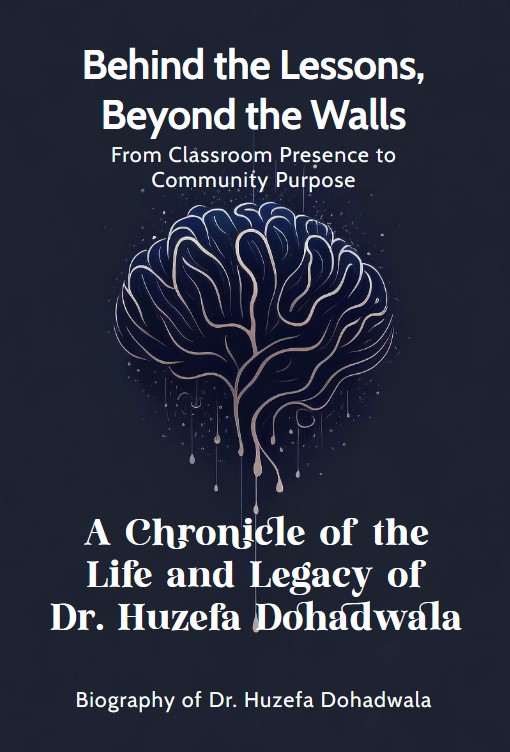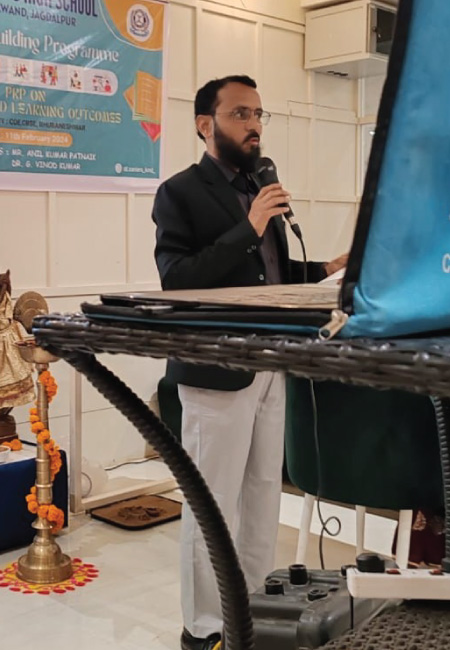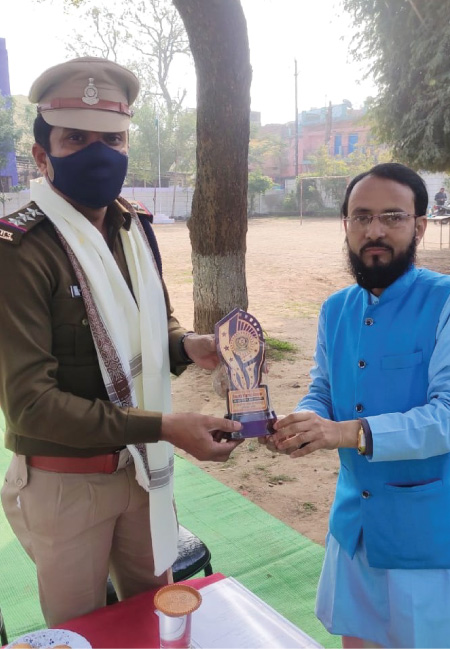

“I walked with purpose, not pace. I never needed to arrive first—I only needed to arrive with something that made the journey meaningful for others.”
Introduction
The story of Dr. Huzefa Dohadwala is not merely the chronicle of an accomplished educator—it is the lived testimony of a man whose life has been built on values, shaped by service, and refined through decades of sincere dedication to the field of education.
Throughout his journey, whether inside a classroom or at the helm of a school, Dr. Dohadwala has exemplified what it means to lead with quiet strength. His approach has never been driven by recognition or titles; it has been shaped by consistency, humility, and a deep belief in the transformative power of education. In every institution he served, and in every student, he mentored, he carried with him not just academic knowledge, but a personal commitment to making a difference—patiently, steadily, and often without seeking credit.
His career has spanned a broad range of roles—from teacher to principal, coordinator to examiner, trainer to mentor. But across all of these, one thing has remained constant: his unwavering focus on responsibility over recognition. His work ethic is marked by discipline, but never devoid of warmth. His leadership inspires not through command, but through presence and integrity.
Beyond formal duties, Dr. Dohadwala’s identity is enriched by his cultural passion, community involvement, and quiet acts of service. Whether singing at a community event, volunteering to teach spoken English to railway families, or supporting underprivileged students in their academic pursuits, he has always remained close to the people he serves. His influence is found not only in school buildings and exam halls, but in the lives and stories of those who have grown under his guidance.
This biography does not attempt to magnify the man through exaggeration. Rather, it seeks to reveal the depth of a life lived with purpose—one decision, one student, one institution at a time. It is a narrative of real work done with real care. It is a reflection of what education can look like when practiced with heart.
In these pages, the reader will discover not just the achievements of Dr. Huzefa Dohadwala, but the values that made those achievements possible—and the enduring message that quiet leadership can be just as powerful, and often more lasting, than loud ambition.
Phase 1 : The Roots of Life
“I carried the dream of wearing a doctor’s coat like a second skin—stitched with hope, sleeved with compassion. When that dream slipped away, it broke something inside me… but in that silence, I found a different purpose, my parents would still be proud of.”

In the quiet, historically textured town of Dohad, Gujarat, where culture and tradition converge in every lane and courtyard, a child named Dr. Huzefa Dohadwala was born on March 31, 1976. The day was ordinary by the world’s reckoning, but for the Dohadwala family, it marked the beginning of a journey that would one day be woven into the fabric of education, aspiration, and human service. He was born to Shri Shabbir Dohadwala and Mrs. Mubina Dohadwala, a modest and deeply principled couple who embodied the values of simplicity, education, and quiet perseverance.
Dr. Huzefa Dohadwala’s father, Shri Shabbir Dohadwala, was a man of great erudition and discipline—a teacher who devoted thirty-five years of his life to the noble vocation of educating young minds. His classroom was not merely a place of rote learning but a sanctuary where thought was shaped, and futures were carved. Shri Shabbir’s life revolved around chalkboards, lesson plans, and the unshakable belief that education is the most powerful tool one can give a child. His integrity and intellectual commitment cast a long shadow over the household, shaping the moral and academic environment in which young Huzefa was raised.
Mrs. Mubina Dohadwala, Dr. Huzefa Dohadwala’s mother, was a homemaker in the most profound sense of the word. Gentle, wise, and nurturing, she managed the household with grace and ensured that warmth, love, and respect formed the foundation of their family life. Though she never stepped onto a professional stage, her quiet sacrifices and the emotional scaffolding she provided proved to be no less important than the public service her husband rendered. Her kitchen was a place of nurturing—not just of the body but of values, dreams, and emotional resilience.
Together, they raised their son with steadfast ideals and quiet ambition. Sadly, both Shri Shabbir and Mrs. Mubina are no longer alive, but their legacies breathe through Dr. Huzefa Dohadwala’s journey. Education was not a privilege in his household; it was a duty and an expectation.
Life led to relocate in different regions—Baroda, Coimbatore, Indore, Bangalore, and later Ahmedabad—each move offering Dr. Huzefa Dohadwala a new landscape of experiences, languages, and cultures. He adapted swiftly, making friends easily and leaving behind impressions of quiet intelligence and respectful conduct. Each new city enriched his worldview, and in turn, these transitions sowed the seeds of resilience and adaptability in his soul.
Phase 2 : Story of the Academics
“Every place I studied left a mark on me. Each subject, each classroom, taught me more than just lessons—they helped me understand who I am and what I value.”

In the early light of dawn, somewhere in the modest town of Sidhpur in Gujarat, a little boy took his first steps into formal education—unaware that this path, though winding and often uncertain, would shape the arc of his future with precision and quiet brilliance. Dr. Huzefa Dohadwala’s academic journey began here, in a world where the values of learning were instilled not through grandeur, but through earnest discipline and everyday moments.
One such moment from his early schooling remains etched in his memory with a vividness time could not erase. It was Independence Day, and the young Huzefa, then in Lower Kindergarten, was chosen to play the role of Jawaharlal Nehru. Draped in a miniature Nehru jacket and adorned with a red rose on his chest, he stood tall—unfurling the Indian tricolour with wide-eyed wonder and unknowing poise. It was more than a school activity; it was a symbolic gesture that, in hindsight, foreshadowed a lifelong commitment to leadership, identity, and service. That moment—simple and ceremonial—ignited in Dr. Huzefa Dohadwala an early sense of belonging to something larger than himself.
From Sidhpur, his academic footprints moved to the vibrant city of Baroda (Vadodara), where he completed his primary education. Baroda became a formative ground for his intellectual curiosity, offering both structure and space to explore a wider world. These were the years when subjects began to take on meaning, and classroom walls expanded into vistas of possibility. The influence of his father, Shri Shabbir Dohadwala, himself a lifelong educator, remained a quiet but guiding presence throughout.
As life continued to take the Dohadwala family across states and cities, the next chapter of his schooling unfolded in Bangalore. Here, amidst a more urban and diverse backdrop, Dr. Huzefa Dohadwala completed his high school education. His adaptability to different cultural and linguistic settings gave him an early edge—not just in academics, but in understanding people, systems, and perspectives. Bangalore widened his exposure, yet he remained rooted in the values nurtured at home.
His higher secondary education brought him to Indore—another city, another beginning. In 1994, Dr. Huzefa Dohadwala successfully completed his 12th-grade studies under the Madhya Pradesh Board in Bhopal, with a science stream that included Chemistry, Physics, Biology, alongside English and Urdu. This academic combination was a direct extension of his childhood aspiration to enter the medical field. While the dream of becoming a physician had encountered setbacks, his commitment to learning remained unwavering.
Phase 3 : Professional Odyssey
“I never chased titles—I focused on the work. And in every classroom, every corridor, I found a new reason to lead with integrity.”

By the turn of the millennium, as the 1990s gave way to a new century, Dr. Huzefa Dohadwala stood at a pivotal crossroads. Armed with a strong academic foundation, enriched by a postgraduate degree in English Literature, he faced a decision that would shape the rest of his life. While opportunities outside education were available, it was a conversation—simple yet decisive—with his father, Shri Shabbir Dohadwala, that redirected the course of his journey. A seasoned teacher himself, Shri Shabbir saw in his son not only the qualities of a scholar, but the temperament of a mentor, a guide, a leader of learning.
Encouraged to remain close to home and begin a stable and meaningful career in education, Dr. Huzefa Dohadwala accepted a position at St. Xavier’s School, a name that would become deeply intertwined with his own over the coming years. What began as a role of a Computer Teacher quickly blossomed into something far more impactful.
His early years at St. Xavier’s were marked by diligence, discipline, and a quiet ambition to rise not in title alone, but in influence. He moved through the academic ranks with grace and merit. For five years, he served as a TGT (Trained Graduate Teacher), during which he refined his pedagogical approach and built strong connections with students. His classes were not merely sessions of instruction but interactive platforms where young minds were guided toward independent thought and ethical growth.
With his growing expertise and a natural command over his subjects, Dr. Huzefa Dohadwala transitioned into the role of PGT (Post Graduate Teacher), a position he held for four years. Here, his ability to engage higher secondary students with clarity, empathy, and rigor distinguished him.
He was no longer simply a teacher—he had become a mentor. He nurtured academic excellence while advocating for moral and emotional development, reflecting the holistic values that education must embody.
His contributions did not go unnoticed. In April 2011, in recognition of his consistent performance, leadership qualities, and administrative potential, Dr. Huzefa Dohadwala was appointed as Academic Coordinator-cum-CCE In-Charge at St. Xavier’s Senior Secondary School, Bilaspur. This marked a significant transition from classroom teaching to educational leadership. In this role, he was entrusted with implementing the CBSE’s Continuous and Comprehensive Evaluation (CCE) framework—a reform-driven initiative aimed at moving beyond rote assessments to more inclusive, skill-based evaluation. Dr. Dohadwala’s methodical nature and vision made him particularly suited for this position. He coordinated faculty development workshops, restructured assessment frameworks, and ensured that the CCE implementation aligned with national standards without compromising on local adaptability.